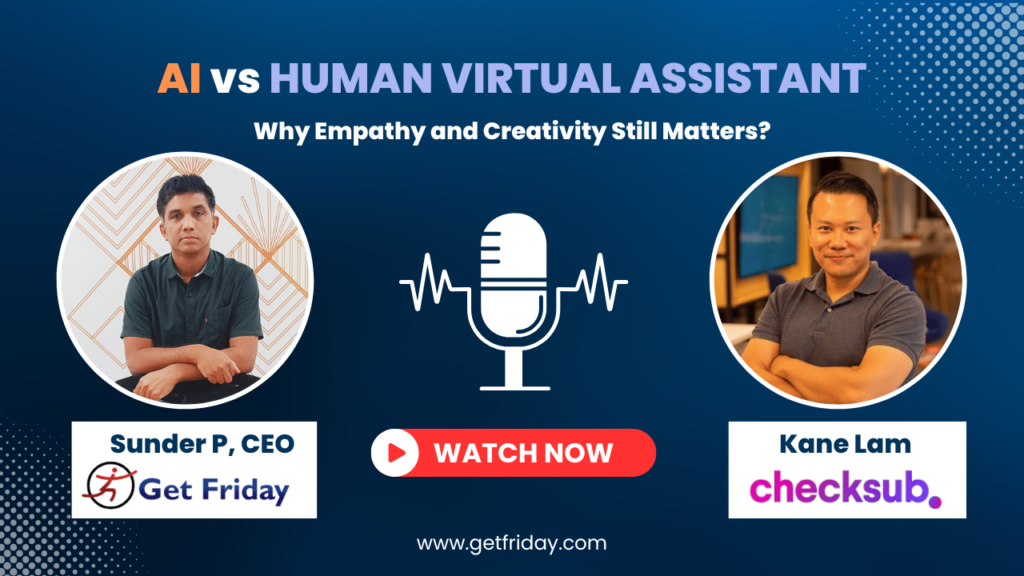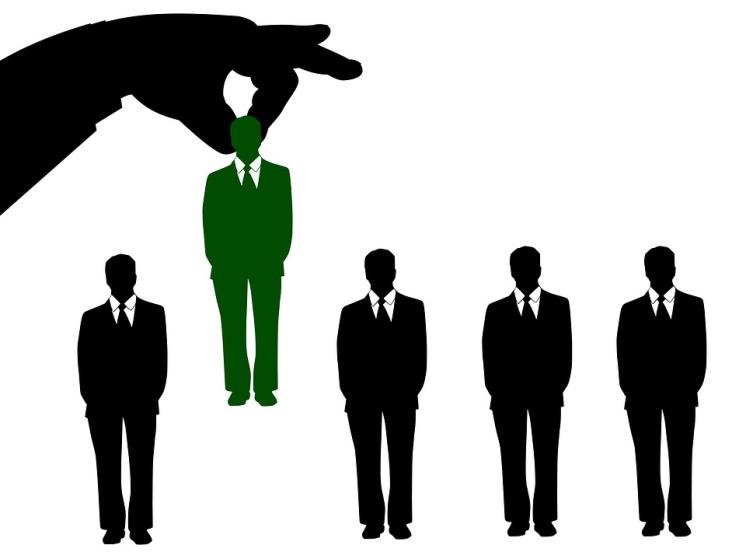AI vs. Human Virtual Assistants: Why Empathy and Creativity Still Matters?
In a recent conversation with Kane Lam from Checksub, Sunder. P (CEO, GetFriday) shared insights on how the rise of AI is reshaping the world of virtual assistant services, highlighting both the benefits and limitations of these technological advancements. While AI (ChatGPT or Gemini (formerly Bard) have streamlined tasks like scheduling and content generation, it lacks the empathy and creativity that only humans can provide. As businesses increasingly adopt AI tools, the irreplaceable human touch in virtual assistance remains crucial for delivering personalized support and ensuring trustworthiness in data and content. The future of virtual assistance lies in blending AI’s efficiency with the value of human empathy, diligence and care. (Kane Lam in Conversation with Sunder P, GetFriday) Video Transcript (Kane Lam Conversation with Sunder P, GetFriday) Kane Lam (Checksub): How is AI impacting your business? How is AI impacting virtual assistance? Sunder (GetFriday): Virtual assistance has come a long way over the last 20 years. There are a lot of things that we used to do that we don’t currently do because there are specialized services on the internet that can accomplish this. A lot of appointment scheduling, for example, calendly is there, you just send you open your calendar and I can fix an appointment. I don’t need anybody to actually do it on my behalf physically. So there are a lot of options that have come up which changes the dynamics of the services that we offer but I still feel that a human touch and there are certain things that cannot be substituted yet by artificial intelligence or any kind of machine learning or any kind of robot that can substitute a human person. So there is also in terms of virtual assistance and human support; there is a certain level of empathy that you display. You empathize, you are having a bad day at work and I am your assistant, I also understand that you are having a bad day at work. So I sort of adjust the way I converse, the way I ask for work or the way I ask you. There are days when you will really be excited and I might also share the same enthusiasm you don’t get that with AI. So working with a human person is totally different. But the range of tasks that have been coming in, like for example, AI has probably wiped out a lot of content writers because anybody can just go to Chat GPT or Bard (now Gemini) and say, “Hey, write me a short article on this subject but the problem there is that it will probably churn out exact replicas or it might not be creative enough because even when you say get more creative; maybe do it better it doesn’t give you anything more creative because it goes and churns the same content over and over again and I don’t think creativity is something that is yet to, it follows certain set patterns and that’s how it can generate the content. And two, there is this classic case of a law firm that actually presented certain AI generated or a ChatGPT kind of references in a legal case where there was a case against an airline called Avianca which operates out of Colombia where there was a personal injury for a person. He had filed a lawsuit against the airline and the law firm representing the client had filed references to cases which happened to be churned out of ChatGPT. And what happened was the opposition lawyers actually found out that those cases never existed which means ChatGPT and such AI tools are actually now starting to create content, create references which do not exist. Which means it becomes a case where you are relying on certain information as being true, authentic but it is not true. So, AI has been built with some loose building blocks where it is supposed to function in a certain way, but you have actually no control over its output at the moment. Nobody can predict what is the result. Not even the engineers who built Bard or built ChatGPT can actually predict what the response will be in a particular situation. That comes to the ethics of doing things through AI. So yes, it can automate things. It can make it faster in some ways. But I think human intervention is still required on any kind of work. You can ask the AI to give you certain data, it can probably crawl and give you certain information and data points, but it still becomes your duty and responsibility to check whether those data points are authentic, true and can be trusted. So that’s where I think we have slowly started getting requests from our clients saying “hey, use ChatGPT, but then ensure I’m on the safe side. Ensure you do your due diligence and ensure data that is being brought out is authentic and can be used.” So these are small businesses that are taking our help to build up websites, to put up content, to publish flyers, to maybe collect data on market research. Use these tools but use it very judiciously. So, we are actually getting down to training our staff on how to use these AI tools very judiciously and ensure that our clients are being protected in every manner. So things will change, it will morph over the next five years but I feel that human intervention will still be required and the human touch and empathy can never ever be replaced. And that’s where virtual assistance with humans makes a world of difference. GetFriday (earlier YMII or YourManInIndia) is a service that was featured and used in the NYTimes best-selling productivity and lifestyle design book ‘The 4-Hour-Workweek’ by Timothy Ferris. Contact Us: https://www.getfriday.com/contact-us Sign Up: https://www.getfriday.com/sign-up
AI vs. Human Virtual Assistants: Why Empathy and Creativity Still Matters? Read More »
In a recent conversation with Kane Lam from Checksub, Sunder. P (CEO, GetFriday) shared insights on how the rise of AI is reshaping the world of virtual assistant services, highlighting both the benefits and limitations of these technological advancements. While AI (ChatGPT or Gemini (formerly Bard) have streamlined tasks like scheduling and content generation, it lacks the empathy and creativity that only humans can provide. As businesses increasingly adopt AI tools, the irreplaceable human touch in virtual assistance remains crucial for delivering personalized support and ensuring trustworthiness in data and content. The future of virtual assistance lies in blending AI’s efficiency with the value of human empathy, diligence and care. (Kane Lam in Conversation with Sunder P, GetFriday) Video Transcript (Kane Lam Conversation with Sunder P, GetFriday) Kane Lam (Checksub): How is AI impacting your business? How is AI impacting virtual assistance? Sunder (GetFriday): Virtual assistance has come a long way over the last 20 years. There are a lot of things that we used to do that we don’t currently do because there are specialized services on the internet that can accomplish this. A lot of appointment scheduling, for example, calendly is there, you just send you open your calendar and I can fix an appointment. I don’t need anybody to actually do it on my behalf physically. So there are a lot of options that have come up which changes the dynamics of the services that we offer but I still feel that a human touch and there are certain things that cannot be substituted yet by artificial intelligence or any kind of machine learning or any kind of robot that can substitute a human person. So there is also in terms of virtual assistance and human support; there is a certain level of empathy that you display. You empathize, you are having a bad day at work and I am your assistant, I also understand that you are having a bad day at work. So I sort of adjust the way I converse, the way I ask for work or the way I ask you. There are days when you will really be excited and I might also share the same enthusiasm you don’t get that with AI. So working with a human person is totally different. But the range of tasks that have been coming in, like for example, AI has probably wiped out a lot of content writers because anybody can just go to Chat GPT or Bard (now Gemini) and say, “Hey, write me a short article on this subject but the problem there is that it will probably churn out exact replicas or it might not be creative enough because even when you say get more creative; maybe do it better it doesn’t give you anything more creative because it goes and churns the same content over and over again and I don’t think creativity is something that is yet to, it follows certain set patterns and that’s how it can generate the content. And two, there is this classic case of a law firm that actually presented certain AI generated or a ChatGPT kind of references in a legal case where there was a case against an airline called Avianca which operates out of Colombia where there was a personal injury for a person. He had filed a lawsuit against the airline and the law firm representing the client had filed references to cases which happened to be churned out of ChatGPT. And what happened was the opposition lawyers actually found out that those cases never existed which means ChatGPT and such AI tools are actually now starting to create content, create references which do not exist. Which means it becomes a case where you are relying on certain information as being true, authentic but it is not true. So, AI has been built with some loose building blocks where it is supposed to function in a certain way, but you have actually no control over its output at the moment. Nobody can predict what is the result. Not even the engineers who built Bard or built ChatGPT can actually predict what the response will be in a particular situation. That comes to the ethics of doing things through AI. So yes, it can automate things. It can make it faster in some ways. But I think human intervention is still required on any kind of work. You can ask the AI to give you certain data, it can probably crawl and give you certain information and data points, but it still becomes your duty and responsibility to check whether those data points are authentic, true and can be trusted. So that’s where I think we have slowly started getting requests from our clients saying “hey, use ChatGPT, but then ensure I’m on the safe side. Ensure you do your due diligence and ensure data that is being brought out is authentic and can be used.” So these are small businesses that are taking our help to build up websites, to put up content, to publish flyers, to maybe collect data on market research. Use these tools but use it very judiciously. So, we are actually getting down to training our staff on how to use these AI tools very judiciously and ensure that our clients are being protected in every manner. So things will change, it will morph over the next five years but I feel that human intervention will still be required and the human touch and empathy can never ever be replaced. And that’s where virtual assistance with humans makes a world of difference. GetFriday (earlier YMII or YourManInIndia) is a service that was featured and used in the NYTimes best-selling productivity and lifestyle design book ‘The 4-Hour-Workweek’ by Timothy Ferris. Contact Us: https://www.getfriday.com/contact-us Sign Up: https://www.getfriday.com/sign-up


